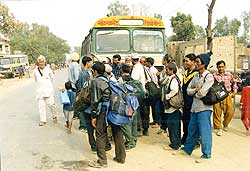 Dasai is a time for homecoming when there are long lines at the border crossing of Rupedia. This year, the Nepalis are going in the other direction: fleeing to India to escape fighting after the ceasefire broke down three weeks ago.
Dasai is a time for homecoming when there are long lines at the border crossing of Rupedia. This year, the Nepalis are going in the other direction: fleeing to India to escape fighting after the ceasefire broke down three weeks ago. Many of them had returned from India after the ceasefire went into effect, only to be displaced again. Most of them are men, and they say farewell to family members and friends who have come down from the hills to see them off at the border. The good byes are brief and perfunctory. There are tears, and faces are downcast. Most don't look back at Nepal after they cross the border with all their belongings in white fertiliser sacks.
"After all these years, I had hoped to celebrate Dasai in peace with all my family but I have to run away to save myself," says Dalbir Giri from Kalaguan in Salyan, a Maoist stronghold. Giri had come back from India after five years and was looking forward to getting to know his family again. But the end of the ceasefire meant he couldn't stay on. "I'm lucky to be alive, some of my friends were not so fortunate," he adds. We don't ask him in whose hands his friends had died. Somehow, it doesn't seem to matter.
After January, many Nepalis came back from India to their home districts of Salyan, Dang, Pyuthan and Jajarkot. They had left their wives, parents and children to get along the best they could amidst the insurgency. The little money they sent home took care of their loved ones. But just before this season of celebrations, as the conflict flared up again, they had to leave again. "If I stay here, I'll get killed," says Shiba Acharya from Jajarkot matter of factly. "What other choice do I have besides running away from home?"
Harka Bahadur BK got a month-long leave from his job in India, but had to leave his family after a few days when the ceasefire broke down and he felt it would be safer to cut his vacation short and leave. "It's not safe at home anymore, that's why I'm leaving," he told us just before crossing over to catch a bus in India. Six other fellow-villagers are with Harka Bahadur. They murmur that it is better to leave than to face the wrath of the Maoists and the harrassment of the army.
 After the ceasefire, many young men from the Maoist heartland in western Nepal were keen to join the army and police force. Many fled the Maoists' forced recruitment drives and preferred to join the army. But the military is suspicious of young men from the mid-western hills, and very few got through the screening process. Now, those who didn't get enlisted are in much greater danger from the Maoists as word spreads that they had tried to join the army.
After the ceasefire, many young men from the Maoist heartland in western Nepal were keen to join the army and police force. Many fled the Maoists' forced recruitment drives and preferred to join the army. But the military is suspicious of young men from the mid-western hills, and very few got through the screening process. Now, those who didn't get enlisted are in much greater danger from the Maoists as word spreads that they had tried to join the army. "I left home to join the army, but they didn't take me in. If I return, I'm sure the Maoists will kill me," says Raju Singh Sejuwal from Hatsinja in Jumla. Raju is among another small group with rucksacks crossing the border at Nepalganj last week.
While most are single men or groups of men from the same village, increasingly there are entire families leaving. Pari Adhikari has left Jagatipur at Jajarkot with his wife and two children. "We have lost all hope, that's why I'm taking my whole family," he told us.
Many families leave home out of fear, others are relatives of kidnapped villagers who have been ordered out. Public notices are posted in the villages threatening death to families that don't leave.
Basanta Shrestha's family in Pipara VDC in Banke was preparing for Dasain when Maoists asked him for Rs 150,000. He failed to produced the amount, and was kidnapped by Maoists. The next morning, a public notice at the local market ordered his family to leave the village or face death.
Last year, when the war was raging, the number of migrants to India was estimated to be around 1,500 every day according to records at Jamunaha police check post here. After the ceasefire, the outflow stopped and the traffic was in the opposite direction with many Nepalis returning home. Now it has reversed once more. "We see many families leaving these days," says Ram Bahadur Thapa, police-in-charge. The estimate is that at least 2,000 leave very day.


